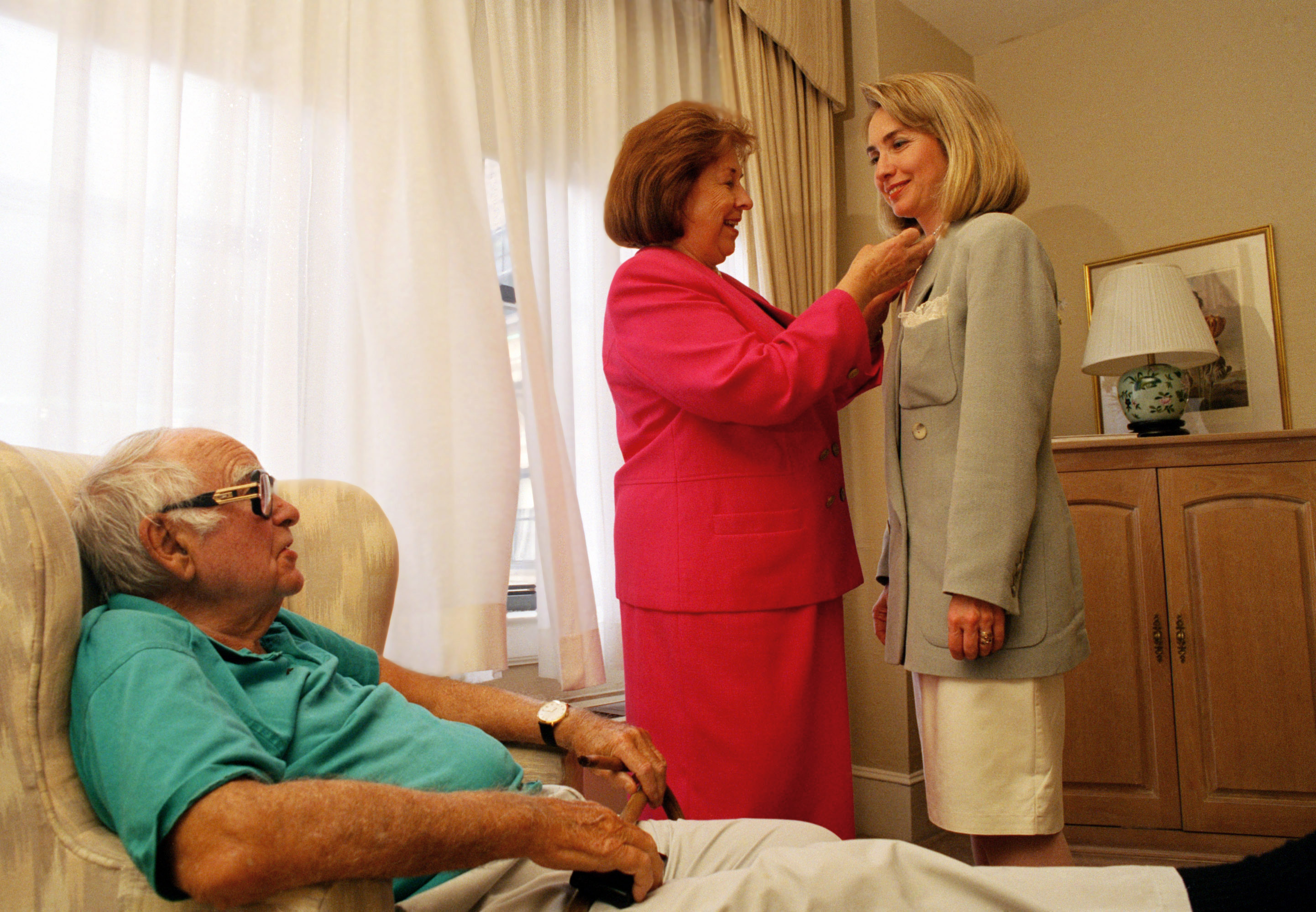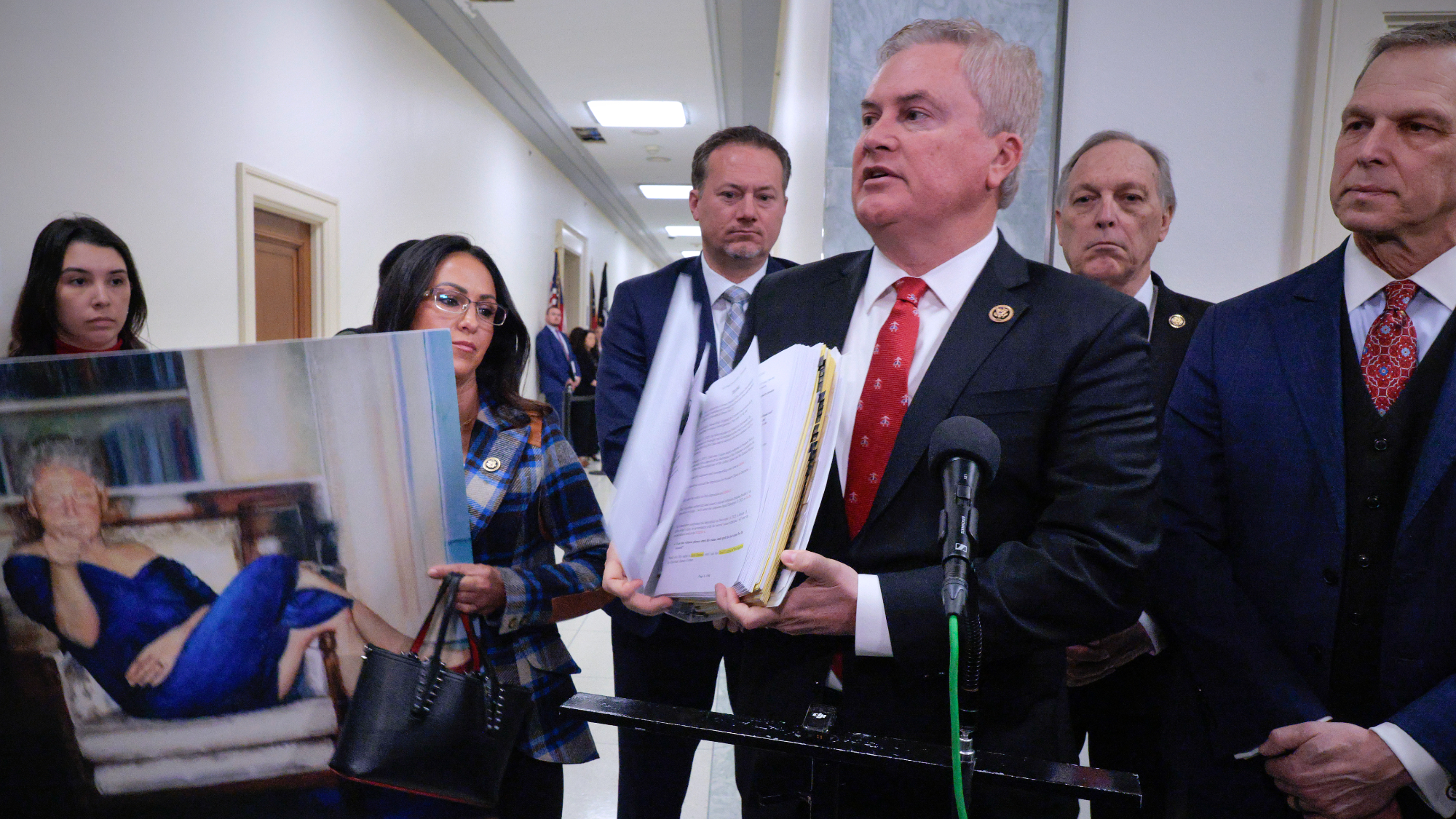Why is Hillary Clinton suddenly talking about her dad?
We're starting to hear the name "Hugh Rodham" on the campaign trail


A free daily email with the biggest news stories of the day – and the best features from TheWeek.com
You are now subscribed
Your newsletter sign-up was successful
Hugh Rodham is the R in HRC. His name rests in the very heart of Hillary Clinton's initials. But for nearly as long as she has been in the public eye, Clinton has scarcely mentioned her small-business-owning Republican father, who died long before his daughter would ever become secretary of state or run for president.
This isn't the case for Clinton's mother. Almost anyone who has watched a rally or speech by Clinton in the past decade knows about Dorothy Rodham, a "frustrated intellectual who devoured books" and "influenced Hillary in her own way," as The Washington Post writes. "Mrs. Clinton has made the struggles of her mother ... a central part of her 2016 campaign's message," The New York Times agrees.
But it is her rarely talked about father, and the influence he had on her development, who is becoming increasingly central to Clinton's campaign in the waning days before the presidential election. That's because Clinton's numbers with working-class white men without college degrees have been dismal, and her history-making campaign — run on the promise that American girls can grow up to be president — fails to inspire this Donald Trump-leaning demographic. Using lessons learned tussling with her father over politics, Clinton hopes to change that.
The Week
Escape your echo chamber. Get the facts behind the news, plus analysis from multiple perspectives.

Sign up for The Week's Free Newsletters
From our morning news briefing to a weekly Good News Newsletter, get the best of The Week delivered directly to your inbox.
From our morning news briefing to a weekly Good News Newsletter, get the best of The Week delivered directly to your inbox.
By all accounts, Hugh Rodham was a tough father and husband, born to an immigrant father and Midwestern mother in 1911, almost a decade before women would get the right to vote. Rodham would spank Clinton and her brothers "at times excessively" and punish his only daughter for leaving the cap off the toothpaste by throwing the tube out the window so she would have to scrounge around for it in the snow. "He would hurl criticism at his wife around the kitchen table at 235 Wisner Street," The New York Times writes. "When she encouraged Hillary to learn for learning's sake, Mr. Rodham, who drove a Cadillac, would quip: 'Learn for earning's sake.' If his children asked for an allowance for their many household chores, he would reply bluntly: 'I feed you, don't I?'"
Rodham died during Clinton's first term in the White House as President Bill Clinton's wife. He had spent his life suspicious of Democrats. But when asked in 2008 what her father would have thought of her running for office as a liberal, Clinton replied after a moment's hesitation: "If it was his daughter, he'd have been fine with it."
As the focus of the 2016 race narrows to blue-collar communities in battleground states like Pennsylvania, Ohio, or Michigan, Clinton is suddenly in the position of having to answer to hardworking lifelong Republicans like her father once more.
For example, Clinton dropped Hugh's name during the first presidential debate. "I can only say that I'm certainly relieved that my late father never did business with you," she snapped at Trump. "He provided a good middle-class life for us, but the people he worked for, he expected the bargain to be kept on both sides."
A free daily email with the biggest news stories of the day – and the best features from TheWeek.com
Then, at an early voting rally in Iowa late last week, Clinton recalled her father toiling in his fabrics factory: "Anyone here ever seen a silkscreen? An old fashioned silkscreen? You put the paint on it and use a squeegee," she said, describing her father's occupation with a smile.
During an August campaign stop in the Detroit suburb of Warren, Michigan, Clinton used her father's story to appeal to a population employed by the likes of General Motors, Chrysler, and the Tank Automotive Research, Development, and Engineering Center: "[Hugh Rodham] expected to be paid when he showed up," she told the audience there. "He did the work. He paid for the supplies and the labor he often hired to help him on big jobs. I can't imagine what would have happened to my father and his business if he had gotten a contract from Trump."
Later, speaking to The Associated Press about the event, Clinton said she felt a "sense of responsibility." "[I am] living proof that a successful small business is at the core of the basic bargain in America, that if you work hard and do your part, you can make your own dreams and those of your children a reality," she explained.
Clinton also made mention of her father at a meeting with African-American women in Columbia, South Carolina, last year:
"My dad was a small businessman," Hillary said. "When I say 'small,' it was small. He ran a small drapery printing business and he literally had a print plant with big long tables that had silk screens. And sometimes my mother and brothers and I would help to pour the paint in and take the squeegee and then we'd walk down the table and we'd print the fabrics and then he would go out and sell them."Ms. Clinton shared the story of her visit earlier in the day to Kiki's Chicken and Waffles (which she highly recommended), and how she spoke with African-American women business owners who told her what they needed to be able to grow their businesses. Clinton said "it sounded so much like the conversation I remember around my dinner table." [Spero News]
This kind of talk might relate to young Americans, as well. When Clinton explained the antiquated methods of silkscreen printing to Iowans in late September, I immediately thought of my own father, also a small business owner and silkscreen printer who, along with my mother, worked many long, labor-intensive hours to feed me, clothe me, and send me to college.
While my relation is a little more on-the-nose than it might be for most young adults, it is true that the sons and daughters of craftsmen, warehouse and factory workers, and small business owners can see something of Hugh Rodham in their own parents. Clinton has struggled to impress young voters (myself included), but to many of us, her words feel like more than empty promises, and Hugh Rodham is the proof that she understands what middle class life is like.
All of this is not to mitigate the historic moment unfolding for mothers and daughters, but to realize it is one for daughters and fathers, too. As Hillary Clinton said in her campaign launch speech last year, "I wish my mother could have been with us longer. I wish she could have seen ... an America where a father can tell his daughter: Yes, you can be anything you want to be. Even president of the United States."
Hillary might not mention Hugh often, but he is there in her words — the unnamed father who may have been tough, gruff, and perhaps not always easy to love. But still, he is there, just as all fathers exist in the fabric of the people we become.
Jeva Lange was the executive editor at TheWeek.com. She formerly served as The Week's deputy editor and culture critic. She is also a contributor to Screen Slate, and her writing has appeared in The New York Daily News, The Awl, Vice, and Gothamist, among other publications. Jeva lives in New York City. Follow her on Twitter.
-
 How the FCC’s ‘equal time’ rule works
How the FCC’s ‘equal time’ rule worksIn the Spotlight The law is at the heart of the Colbert-CBS conflict
-
 What is the endgame in the DHS shutdown?
What is the endgame in the DHS shutdown?Today’s Big Question Democrats want to rein in ICE’s immigration crackdown
-
 ‘Poor time management isn’t just an inconvenience’
‘Poor time management isn’t just an inconvenience’Instant Opinion Opinion, comment and editorials of the day
-
 Clintons defy House GOP on Epstein subpoenas
Clintons defy House GOP on Epstein subpoenasSpeed Read The House has already received what ‘little information we have,’ the Clintons said
-
 The billionaires’ wealth tax: a catastrophe for California?
The billionaires’ wealth tax: a catastrophe for California?Talking Point Peter Thiel and Larry Page preparing to change state residency
-
 Bari Weiss’ ‘60 Minutes’ scandal is about more than one report
Bari Weiss’ ‘60 Minutes’ scandal is about more than one reportIN THE SPOTLIGHT By blocking an approved segment on a controversial prison holding US deportees in El Salvador, the editor-in-chief of CBS News has become the main story
-
 Has Zohran Mamdani shown the Democrats how to win again?
Has Zohran Mamdani shown the Democrats how to win again?Today’s Big Question New York City mayoral election touted as victory for left-wing populists but moderate centrist wins elsewhere present more complex path for Democratic Party
-
 Millions turn out for anti-Trump ‘No Kings’ rallies
Millions turn out for anti-Trump ‘No Kings’ ralliesSpeed Read An estimated 7 million people participated, 2 million more than at the first ‘No Kings’ protest in June
-
 Ghislaine Maxwell: angling for a Trump pardon
Ghislaine Maxwell: angling for a Trump pardonTalking Point Convicted sex trafficker's testimony could shed new light on president's links to Jeffrey Epstein
-
 The last words and final moments of 40 presidents
The last words and final moments of 40 presidentsThe Explainer Some are eloquent quotes worthy of the holders of the highest office in the nation, and others... aren't
-
 The JFK files: the truth at last?
The JFK files: the truth at last?In The Spotlight More than 64,000 previously classified documents relating the 1963 assassination of John F. Kennedy have been released by the Trump administration
